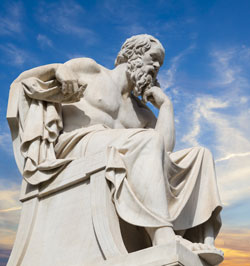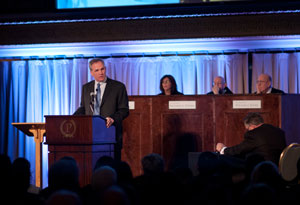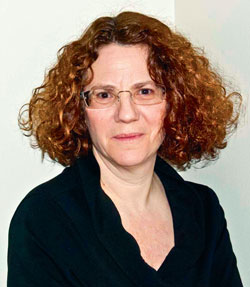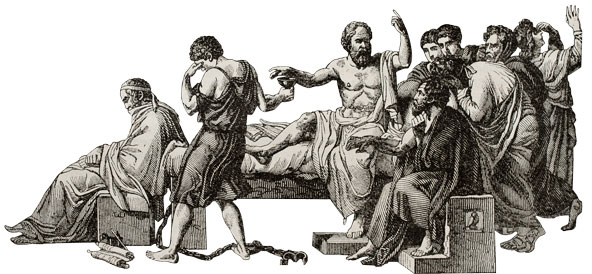Trial of Socrates still raises questions about the relationship between citizens and their states

Shutterstock.com
More than two millennia after his trial and execution, the ancient Greek philosopher and teacher Socrates still is producing food for thought.
That was apparent at a program held in Chicago on Jan. 31, when four of the city’s top trial lawyers re-enacted one of the most famous trials in history. Their arguments touched on still-unsettled questions about the nature of democracy and the relationship between citizens and their governments.
One of the key issues raised by the trial of Socrates is how a democratic society should deal with its gadflies and agitators, says S. Sara Monoson, a professor of political science and classics at Northwestern University in Evanston, just north of Chicago. In the 20th century, she says, “Socrates became almost venerated as a democratic hero who personified the value of free speech and civil disobedience.” But the trial showed that the emphasis a society places on conflicting values can expand or contract during times of tension and tumult.
Socrates also raised questions about the meaning of citizenship, says Robert A. Clifford, the founding partner of Clifford Law Offices.
“What’s fascinating about Socrates is that so many disciplines depend on the Socratic method, and we view him as one of the earliest ethicists because his method required much reflection about the need to live a meaningful life for the good of the community,” says Clifford, a past chair of the ABA Section of Litigation who serves as state delegate for Illinois in the association’s House of Delegates. “His view was: If you weren’t contributing to society, you weren’t leading a good life. He was the original cross-examiner, to reflect on what was necessary to contribute to society, to live that good life.”
The actual trial of Socrates in 399 B.C. took place in an Athens that, just five years after a devastating defeat by Sparta in the Peloponnesian War, was uneasy about its internal stability and uncertain about its future. The city-state’s democratic structures were being challenged from within by groups seeking to impose an oligarchy. “It was a lot like the McCarthy era of the 1950s or the post-9/11 period,” Monoson notes.
Socrates was 70 when he was charged by three fellow citizens with religious impiety and corrupting the youth of Athens with his political ideas, which some viewed as challenges to the governing structure, even though he had acted as something of a political gadfly for half a century. Athenian law did not provide for prosecutions by the state, so Socrates and his accusers presented their own arguments before a jury of 500 citizens, who cast their votes for conviction or acquittal by dropping specially marked discs into jars. The jury convicted Socrates, then voted for the death penalty over his argument that he should receive no punishment at all. Rather than flee the city, he drank a cup of poisonous hemlock while surrounded by friends in a cell at the Athens jail.

Patrick Fitzgerald: “How do we know history got it wrong? We need to give the Athenians their fair due.” Photo by Dimitri Eliopoulos of Elios Photography, LLC.
HOLD OFF ON THE HEMLOCK
Twenty-four centuries later, an audience of nearly 1,000 people attending the trial re-enactment found Socrates guilty again. But at least this time around, he wouldn’t have to down that fatal cup of hemlock. The event was sponsored by the National Hellenic Museum in Chicago.
Efforts were made in the re-enactment to replicate the trial procedures of ancient Athens, but it was difficult for the lawyers and the audience not to look at the case through the prism of the 21st century A.D. One of the prosecutors, Patrick J. Fitzgerald, acknowledged that difficulty when he said, “How do we know history got it wrong? We need to give the Athenians their fair due.” Fitzgerald, the former U.S. attorney for the Northern District of Illinois, is a partner at Skadden, Arps, Slate, Meagher & Flom.
The other prosecutor, Patrick M. Collins, struck the same theme when he told the audience: “Do not judge the society of Athens; judge whether he committed these offenses.” Collins, who worked for Fitzgerald as an assistant U.S. attorney, is a partner at Perkins Coie.
At the same time, the program showed how issues from the original trial of Socrates still resonate today. “Some are fearful that Athens no longer can tolerate anyone like Socrates who would dare suggest that we can improve democracy or that our young people can think for themselves,” said defense counsel Dan K. Webb, who preceded Fitzgerald as U.S. attorney in Chicago and who now is a partner at Winston & Strawn. “These accusers want to abolish free speech, and these charges have put free speech on trial.”
Webb’s co-counsel, Clifford, said, “You may not like what he had to say, but these accusations come from fear-mongerers, and fear-mongering is never good for ‘we the people.’ ” Clifford and Webb both emphasized that Socrates had been playing the role of gadfly to Athens’ political structure for 50 years without repercussions.

S. Sarah Monoson: “Socrates became almost venerated as a democratic hero who personified the value of free speech and civil disobedience.” Photo courtesy of Northwestern University.
DEFIANT TO THE END
When it came time to reach a verdict, the audience followed the example of the ancient Athenian jury by using discs to cast their votes—but these were plastic. When the discs—white for acquittal, blue for conviction—were dumped into scales of justice at the front of the room, conviction clearly carried more weight. (It is not known how many votes to convict were cast by lawyers finally striking back against the miseries they endured in law school while acclimating to the Socratic method.)
A three-judge “court” agreed with the verdict in a 2-1 vote, with only Richard A. Posner, a judge on the 7th U.S. Circuit Court of Appeals at Chicago, dissenting. “I admit to being a little bothered about putting to death a 70-year-old loudmouth,” he said. Meanwhile, a celebrity panel of jurors reached a 7-7 deadlock.
But when it came time to sentence Socrates, the judges and jury relented. No death penalty. No cup of hemlock. Just a slap on the wrist. After Judge Anna H. Demacopoulos of the Cook County Circuit Court suggested a fine of 3,000 silver drachmas (a coin used in ancient Greece), her fellow court member, Judge William J. Bauer of the 7th Circuit, closed the proceedings in a way that any denizen of Chicago’s courts would understand. “I don’t know the value of a drachma,” said Bauer, “but I’d fine him two bucks and let him go.”
Ancient Athens didn’t work quite that way. “There was nothing the Athenian authorities could do,” says Monoson. “The process had run its course. The most they might do was look the other way while Socrates fled into exile. But I really think it’s Socrates’ defiance, the fact that he drank the hemlock, the fact that he forced the Athenians to follow through to the logical conclusion of his accusers’ indictment that makes this trial still memorable. Perhaps he thought he could still be a gadfly from the grave, creating an opportunity for posterity to return to these critical questions.”

Shutterstock.com



